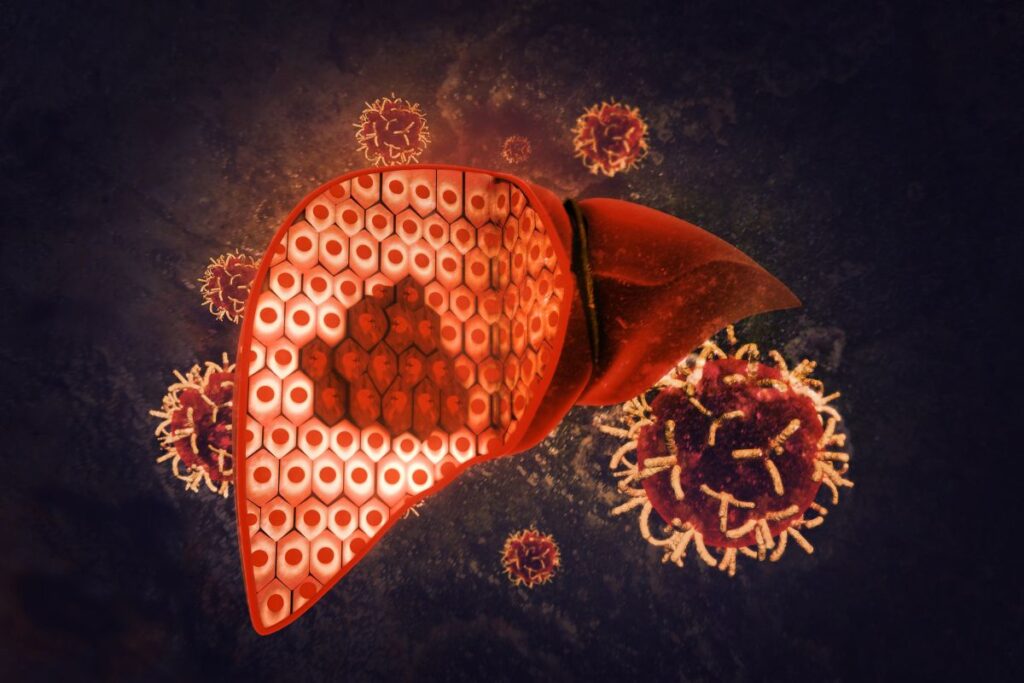Liver cancer, or hepatocellular carcinoma (HCC), is a type of cancer that begins in the liver. It is one of the most common cancers worldwide and often develops in people with chronic liver disease, including cirrhosis and hepatitis B or C. This article provides an overview of the red flags, screening recommendations, diagnostic tests, and treatment options for liver cancer.
Red Flags and Symptoms of Liver Cancer
In its early stages, liver cancer may not show any symptoms. However, as the disease progresses, the following symptoms may appear:
1. Unexplained Weight Loss: Sudden weight loss without trying is a common symptom of liver cancer, often accompanied by loss of appetite.
2. Upper Abdominal Pain or Discomfort: Pain or discomfort in the upper right side of the abdomen can occur as the liver enlarges or a tumour develops.
3. Jaundice: Yellowing of the skin and eyes (jaundice) occurs when the liver cannot process bilirubin properly, which may be a sign of liver cancer.
4. Nausea and Vomiting: persistent nausea and vomiting, especially when combined with other symptoms, should not be ignored.
5. Swollen Abdomen: Accumulation of fluid in the abdomen (ascites) can be a sign of liver cancer, often causing noticeable swelling.
Screening for Liver Cancer: Who Should Get Tested and When?
Liver cancer is more common in individuals with pre-existing liver conditions, such as hepatitis or cirrhosis. Regular screening is crucial for high-risk individuals.
1. Ultrasound: For individuals at high risk (e.g., those with cirrhosis or chronic hepatitis B or C), an abdominal ultrasound should be done every six months to detect tumours early.
2. Alpha-Fetoprotein (AFP) Blood Test: This blood test measures levels of AFP, a substance often elevated in people with liver cancer. It is used in conjunction with ultrasound for screening.
3. CT Scan or MRI: If an ultrasound shows an abnormality, a CT scan or MRI may be used to confirm the diagnosis and assess the extent of the cancer.
Diagnostic and Screening Tests for Liver Cancer
1. Ultrasound: The most common screening tool used for liver cancer. It uses sound waves to create images of the liver and can detect the presence of tumours.
2. CT or MRI Scan: These imaging tests provide more detailed images of the liver and can help determine if cancer has spread to other body parts.
3. Biopsy: A sample of liver tissue is extracted to check whether the cancer is present or not. This can be done through a needle or during surgery.
4. AFP Blood Test: While liver cancer may be indicated by elevated AFP levels in the blood, hepatitis and other illnesses can also cause elevated AFP levels.
Treatment Options for Liver Cancer
Treatment for liver cancer is determined by the stage, the patient’s liver function, and overall health. Here are standard treatment options:
1. Surgery: If the tumour is confined to one area of the liver and the liver function is good, surgical removal of the cancer (liver resection) may be an option.
2. Liver Transplantation: In cases of cirrhosis or other conditions where the liver is too damaged, a liver transplant may be necessary.
3. Ablation Therapies: Techniques such as radiofrequency ablation (RFA) or microwave ablation (MWA) use heat to destroy cancer cells.
4. Chemotherapy: Chemotherapy drugs treat advanced liver cancer, either intravenously or directly into the liver.
5. Targeted Therapy: target particular chemicals involved in the cancer process in an effort to stop the growth of cancer cells.
6. Immunotherapy: Immunotherapy can boost the immune system’s ability to fight cancer.
Cancer Myths: Busting Common Misconceptions About Liver Cancer
1. Myth: Liver cancer only affects people with alcohol-related liver disease.
Fact: While alcohol abuse can cause cirrhosis, liver cancer can also develop in people with hepatitis B or C, obesity, or fatty liver disease.
2. Myth: Early-stage liver cancer symptoms are permanently visible.
Fact: Most of the time, liver cancer does not show any symptoms until it has reached advanced stages. Regular screening is important for those people who are at high risk.
3. Myth: Liver cancer is always a terminal disease.
Fact: It is possible to treat liver cancer, especially when caught early.
How HealthPil Can Help:
Liver cancer can be managed if the patient is diagnosed early and quickly gets treatment. Professional medical advice and consultations with oncologists who specialise in liver cancer are available at HealthPil. Our platform provides simple access to specialists for second opinions, treatment instructions, and advice on screening protocols.
FAQs: Your Liver Cancer Questions Answered
What are the symptoms of liver cancer?
Symptoms include unexplained weight loss, upper abdominal pain, jaundice, nausea, vomiting, and swollen abdomen.
How is liver cancer diagnosed?
It is diagnosed using imaging tests like ultrasound, CT or MRI scans, AFP blood tests, and biopsy.
Who is at risk for liver cancer?
Individuals with cirrhosis, hepatitis B or C, excessive alcohol use, or a history of liver disease are at higher risk.
What options are there for liver cancer treatment?
Treatment options include surgery, liver transplantation, ablation therapies, chemotherapy, targeted therapy, and immunotherapy.
How can liver cancer be prevented?
Regular screenings for high-risk individuals, vaccination against hepatitis B, and avoiding excessive alcohol consumption can reduce the risk.
Disclaimer:
The information provided here is for educational purposes only and should not be used as a substitute for professional medical advice, diagnosis, or treatment. Always consult your healthcare provider for medical advice tailored to your specific condition.

